Mid-latitude storms known as nortes (northers) disturb the normal weather patterns up to 20 times a year during winter, from November to March. They occur when northern polar air moves south into northern and central Mexico. They bring low pressure (cyclonic) conditions, heralded by the arrival of a cold front. The polar air displaces the […]
Mexico’s pearl collection industry: from boom to bust in less than 100 years

In a previous post, we looked at the early history of pearl collecting in Mexico. In this post, we carry the history forward to the present-day. The search for oyster shells with pearls inside was revolutionized after 1874 when larger vessels, equipped with diving suits and accompanying equipment, first entered Mexican waters. The newer methods […]
“The book is a masterpiece…” — quote about Geo-Mexico, the geography and dynamics of modern Mexico
Douglas Fir, a Californian, is a true world traveler having spent time in literally scores of countries on five continents. With degrees (including one in geography) from both San Francisco and Humboldt State Universities, Douglas has traveled widely in Mexico since the 1950s. Now retired, he and his wife spend every winter in Mexico in […]
Updates on the geography of Mexico City (26 March 2011)
This is the second in our series of periodic round-ups of news items related to the geography of Mexico City. The link to our first update in the series is Updates on the geography of Mexico City (13 December 2010) Water meters in Mexico City Ooska News reports that the SACM (Sistema de Aguas de […]
Can Mexico’s Environmental Agency protect Mexico’s coastline?

A case study of the Cabo Cortés tourism megaproject in Baja California Sur The Cabo Cortés megaproject is planned for the area near Cabo Pulmo on the eastern side of the Baja California Peninsula. Cabo Pulmo, a village of about 120 people, is about an hour north of San José del Cabo, and on the […]
An in-depth analysis of drug violence in Mexico from the University of San Diego’s Trans-Border Institute
The Trans-Border Institute (TBI) at the University of San Diego has published a very informative analysis of drug violence in Mexico which goes into far more depth than our short blog posts. The report is part of the TBI’s Justice in Mexico initiative, which is focused on crime, policing and the legal system in Mexico. […]
Is this the beginning of the end for blue corn tortillas?
In two previous posts, we looked at the contentious debate surrounding the introduction of GM corn to Mexico. The debate over GM corn in Mexico Now, Mexico’s Agriculture Secretariat has approved a pilot program by Monsanto to sow up to 1 hectare (2.47 acres) in the northern state of Tamaulipas with GM corn. Only a […]
Where is the best place in Mexico to celebrate the Spring Equinox?

The main pyramid at the Maya site of Chichen Itza in the Yucatán Peninsula is the most popular site in Mexico for crowds to gather and celebrate the Spring Equinox (March 20-21). The Maya were accomplished astronomers and were able to accurately predict equinoxes, eclipses and other celestial events hundreds of years in advance. Crowds […]
Mexico takes on childhood obesity
As we noted in a previous post – Soft drinks, obesity, ,diabetes and public health in Mexico – Mexico has one of the highest obesity rates in the world, and public health officials are increasingly alarmed by the rapid rise in child and youth obesity. About one-third of children in Mexico are now classified as […]
Mexico’s long romance with pearls began way before the arrival of Spanish explorers

This post highlights the pearl, the beautiful birthstone associated with the month of June. Few people realize that Mexico was once the world’s major source of pearls. The history of pearl collecting in Mexico goes back a very long way. When Spanish explorers sailed into the Sea of Cortés (Gulf of California) in the early […]
Consumer shopping habits and regions in Mexico
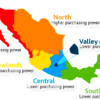
Nielsen, the world’s leading consumer information and research company (offices in more than 100 countries), recently analyzed the shopping habits of consumers in Mexico. From a geographical perspective, one of the most valuable aspects of the study is Nielsen’s use of consumer purchasing habits to suggest a division of Mexico into distinct shopping regions. The […]
Mexican migrant farmworkers in the USA
The Economist (December 18-31, 2010) has a three-page article about migrant Mexican farmworkers, entitled “Fields of tears: they came to America illegally, for the best of reasons” (subscription required for web access). This article is a great educational resource, offering dozens of possible debating points. It relates the adventures and misadventures of a young family […]
The purity of illicit drugs declines with distance from the Mexico-USA border
The concept of distance decay is often used by geographers when trying to describe and explain spatial patterns. Distance decay is the “attenuation of a pattern or process with distance” (Dictionary of Human Geography, Blackwell 1986). It is one of the fundamental concepts behind many geographic models (e.g. Christaller, von Thünen) and the basis of […]
Mexico’s population pyramid (age-sex diagram) for 2010

The population pyramid for Mexico in 2010 is shown below: What does this pyramid tell us about Mexico’s population and possible future trends? The number of babies born during the last 20 years has been more or less equal for each 5-year period. This is despite a higher number of females in the age-bearing categories […]
How sustainable is commercial fishing in northwest Mexico?
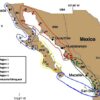
Mexico’s fishing industry now accounts for only 0.24% of gross national product. The relatively shallow waters off the Pacific coast and abundance of plankton in waters cooled by the Californian current make for particularly good fishing in the north-west. Together, Sinaloa (23%) and Sonora (22%) account for about 45% of the national total. Fishing is […]
Plans for a tourism megaproject in Sinaloa, a Pacific Coast “Cancún”
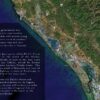
The National Fund for Tourism Infrastructure (renamed the National Tourism Development Fund, Fonatur, in 1974) began building Cancún in 1970 and Ixtapa in 1971, followed later by Los Cabos, Loreto and Huatulco. Fonatur has also started to develop a mega-project on a stretch of coastline north of Puerto Vallarta known as Riviera Nayarit. Fonatur’s latest […]
The pros and cons of floriculture in Mexico
In a previous post – Mexico’s flower power – we looked at the Mexico’s floriculture sector. Mexico’s immense biodiversity, one of the greatest on the planet, and its variety of climates have encouraged the cultivation of ornamental flowers, principally for the domestic market, but also for export. In this post, we present a summary of […]
Overfishing in Mexico’s Sea of Cortés (Gulf of California)
The Sea of Cortés (Gulf of California) is one of the world’s top five seas in terms of ecological productivity and biological diversity. The region is world famous for its recreational sports fishing. Background to the region’s wetlands Among rivers feeding the Sea of Cortés are the Colorado, Fuerte and Yaqui. Its coast includes more […]
Mexico’s flower power…
Given its diversity of climates and immensely varied natural flora (see Mexico’s mega-biodiversity, Mexico is ideally suited for commercial floriculture (flower growing). Helped by government support, floriculture expanded rapidly in the 1980s and 1990s. About 14,000 hectares of agricultural land are devoted to ornamental flowers, with 10,000 growers concentrating on 50 different varieties, the most […]
The history and scope of geography
Dr Jerome Dobson, who led the Bowman Expedition to Mexico, gave the 2010 Jefferson Science Lecture to the US Department of State on “Geography: Use It Or Lose It“: Full text of “Geography: Use It Or Lose It” with link to video was at http://www.state.gov/e/stas/series/154218.htm [March 2011] This lecture ranges widely across the history and […]
Geography research in Oaxaca funded by the US military stirred up a storm of protest
In 2005, a geography research project known as México Indígena, based at the University of Kansas, received 500,000 dollars in funding from the US Defence Department to map indigenous villages in two remote parts of Mexico, in collaboration with the Autonomous University of San Luis Potosí , Radiance Technologies (USA), SEMARNAT (Mexico’s federal environmental secretariat) […]
The changing geography of drug trafficking routes in Mexico
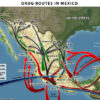
Last year, we reproduced an earlier version of this Stratfor map in The geography of drug trafficking in Mexico. The recently released new version, shown below, shows several changes from the earlier version. Map © Copyright 2010 Strategic Forecasting Inc, STRATFOR www.stratfor.com. This map is republished with permission of STRATFOR. The main changes are that […]

Mexico is the world’s seventh largest coffee producer and one of the leading suppliers of organic, shade-grown coffee. The nation’s 480,000 coffee growers, most working small parcels of land less than 5 hectares (12 acres) in size, are concentrated in Chiapas, Veracruz and Oaxaca, and produce 268,000 metric tons a year. While Mexican coffee consumption […]
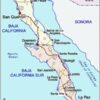
The Baja California peninsula is one of the most arid areas in Mexico and water shortages are becoming critical, especially along the southern coastline which has matured into one of the most desirable jet-set locations in the world. Desalination, which involves removing the salts from seawater or brackish water to provide drinking water, is one […]
Cold weather wreaks havoc on crops in Sinaloa, Mexico
Corn production has been the core of Mexican agriculture throughout its history, and continues to be very important. Production has increased by more than 40% since 2000. Currently corn is grown on about half of all agricultural land. However, corn is a rather low value crop and accounts for only about 14% of total crop […]
Review of Geo-Mexico by Geographic Travels
Geographic Travels is one of the web’s most popular and long-established geography blogs. Here is what they had to say about Geo-Mexico: Book Review: Geo-Mexico Earlier we featured the great blog, that is still active, Geo-Mexico. The blog Geo-Mexico is a promotion blog for the book, also called Geo-Mexico. We received a review copy of […]

Tomatoes are one of the many native Mexican plants that have become essential ingredients in the cuisine of many countries. Mexico is the 10th largest tomato producer in the world, after China, USA, India, Turkey, Egypt, Italy, Iran, Brazil and Spain (FAO 2008). Mexico produces both red tomatoes (tomate or jitomate, depending on the region) […]
The ten states in Mexico with the lowest population density

In a previous post we looked at “The ten states in Mexico with the highest population density“. At the end of that post, we suggested that you try to guess which 10 states in Mexico have the lowest population density. In this post, we look at the answer! Below is a table showing the 10 […]
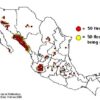
The commercial greenhouse production of horticultural crops in Mexico started in the 1950s, with floriculture (flower-growing) operations. It then expanded to include some vegetables in the 1980s. During the 1990s, larger, more modern greenhouses were introduced specializing in the growing of vegetables for export markets. In 1991, Mexico had only 51 hectares of vegetable production […]
The January 2011 issue of Scientific American contains “Casualties of Climate Change” which takes an in-depth look at three case studies (Mozambique, Mekong Delta and Mexico) where (according to the authors) climate-forced migrations will be inevitable in the next 70 years. The article combines research which formed part of the European Commission’s Environmental Change and […]